Four men accused of carrying out the attack on a Russian concert hall on Friday, which killed at least 137 people and injured 145 more, appeared before a Moscow court yesterday on terrorism charges, showing signs of severe beatings. The attack has been claimed by the Khorasan branch of the Islamic State, or IS-K, which is mainly active in Afghanistan. (AP)
Our Take
The fact that IS-K was able to stage such a brazen and large-scale attack, even after the U.S. issued a warning about the risk of one occurring just a few weeks before, suggests that Russia’s domestic security is somewhat porous. That may be because the regime of President Vladimir Putin has in recent years focused more on crushing political dissent when it comes to internal threats.
As a result, having failed in protecting the Russian population—a hallmark of Putin’s political brand—Moscow now seems intent on avenging the attack. That can be seen in the treatment of the gunmen Russia has captured. Not only do they show signs of severe torture, but graphic videos of them being beaten while under interrogation have circulated widely on Russian social media. The public display of extralegal violence can be read not only as a perverse message of reassurance for domestic consumption, but also as Moscow highlighting its alternative civilizational model of authoritarian legal norms for an international audience.

